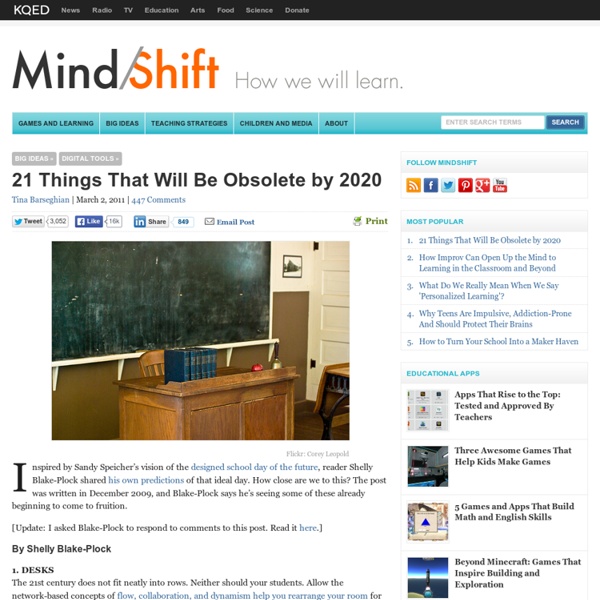



http://blogs.kqed.org/mindshift/2011/03/21-things-that-will-be-obsolete-by-2020/
Related: MCHS SCIENCE • Inglés100 Coolest Science Experiments on YouTube - X-Ray Technician Schools Although YouTube has something of a reputation as a repository for the inane mental diarrhea of stunted man-children injuring each other for cheap laughs or shrill teenage drama queens shrieking like harpies over the latest bland, interchangeable lump passing as the epitome of masculine beauty, many others thankfully take advantage of its services as a portal to share their knowledge and educate viewers. While few of the scientific offerings formally follow the scientific method or test an explicitly stated hypothesis, even those videos veering more towards demonstrating various principles, theories, and laws still offer visitors a chance to learn something about how the world around them operates. By this point, it should go without saying that many of the following videos contain procedures that may be dangerous to perform at home or without the proper equipment and/or training. Please do not duplicate any of these experiments unless assured that they are entirely safe for amateurs.
Why Your Students Don't Remember What You Teach - Why Your Students Don’t Remember What You Teach: The Overwhelming Power Of ‘Place’ In Learning by Terry Heick A decent question: Why don’t your students remember what you’ve taught? A better question: Why don’t they understand what you’ve taught? A better question still: Why don’t students understand and use what they’ve been taught to create a better world? Lessons In Creative Workspaces From A Startup In An Italian Villa Dan Hill is the CEO of company whose workspace is so beautiful that it "might just break the internet through its sheer brazen beauty": a 17th-century villa near Treviso, Italy. The space is an "incredible gift" to Fabrica from its parent company, Benetton, Hill says, one that they feel fortunate to have, and, as well, a smidgen awestruck. For a company that's hacking hardware and making physical prototypes, however, all those clean lines get a little claustrophobic. The building isn't the stage-set for creativity, he says, but a part of the toolkit. We need to get messy.
free online learning for careers, work, management, business training and education: find materials, articles, ideas, people and providers for teaching, career training, self-help, ethical business education and leadership; for personal, career and organi How is businessballs is organized?... Below is an alphabetical listing of the main categories of information on this website, many of which equate to webpages. Businessballs has many very big webpages containing lots of sub-sections, rather like Wikipedia. Many of the sub-sections may be subjects in their own right. There are lots of internal site links from one subject to other releated subjects, so often the best way to learn about a subject is simply to start with a main section and follow the links to other content/subjects that you discover along the way.
Best Teacher I Ever Had Best Teacher I Ever Had by David Owen Extracted from Reader's Digest (Asian Edition), April 1991, pp. 47-48. Mr. Science Classroom Lessons Microscope Mania Pond Water Survey Hydra Investigation Animal Classification Challenge Incredible Edible Cells - Cell Project Construction Zone - Cell Project Mitosis Flip Books Genetics with a Smile + SpongeBob Genetics DNA Keychains & Replication Protein Power Game Egg-cellent Ideas for Osmosis & Diffusion Human Body Activities (Body Systems, Skeletal System, Muscular System) Also see Silly Science - a dichotomous key activity in General Science section! Internet Lessons • The Organ Trail - Challenge your students to create a "Wanted" poster about an organ. This download provides project guidelines, student information, and project worksheets. Links for students can be found on the Health & Human Body links page of the Kid Zone. • Microscopes Online (pdf) (Internet Lesson) - Use this worksheet to help your students explore the history of the microscope as well as other sites listed on the Cells & Microscopes page of the Kid Zone .
3 Big Don’ts When Converting Instructor-Led Training to eLearning With benefits like automation, consistent messaging, wider reach, and the ability to provide 24/7 learning, eLearning is an option that more and more companies have started to embrace. But now what do you do with those PowerPoint slides that you created ages ago and had been delivering to your employees since then? If that training program is effective, don’t ditch it. You can convert it into an eLearning program without reinventing the wheel. But look out for these common mistakes that companies do when converting PowerPoint and Instructor-Led Training to eLearning because they don’t realize that eLearning and classroom learning are different: 1.
The Third Teacher: from classrooms to learning ecologies - Education Today “Space: the final frontier. These are the voyages of the starship Enterprise. Its five-year mission: to explore strange new worlds, to seek out new life and new civilizations, to boldly go where no man has gone before.” Introduction The opening voice over from Gene Roddenberry’s 1960 science fiction classic Star Trek set in the 23rd Century is a nice juxtaposition with the Reggio Emilia’s organisation of the physical environment in education, often referred to as the child’s “third teacher”. The Reggio approach places a great deal of importance in the belief that children can best create meaning and make sense of their world through environments which support complex, varied, sustained, and changing relationships between people, the world of experience, ideas and the many ways of expressing ideas.